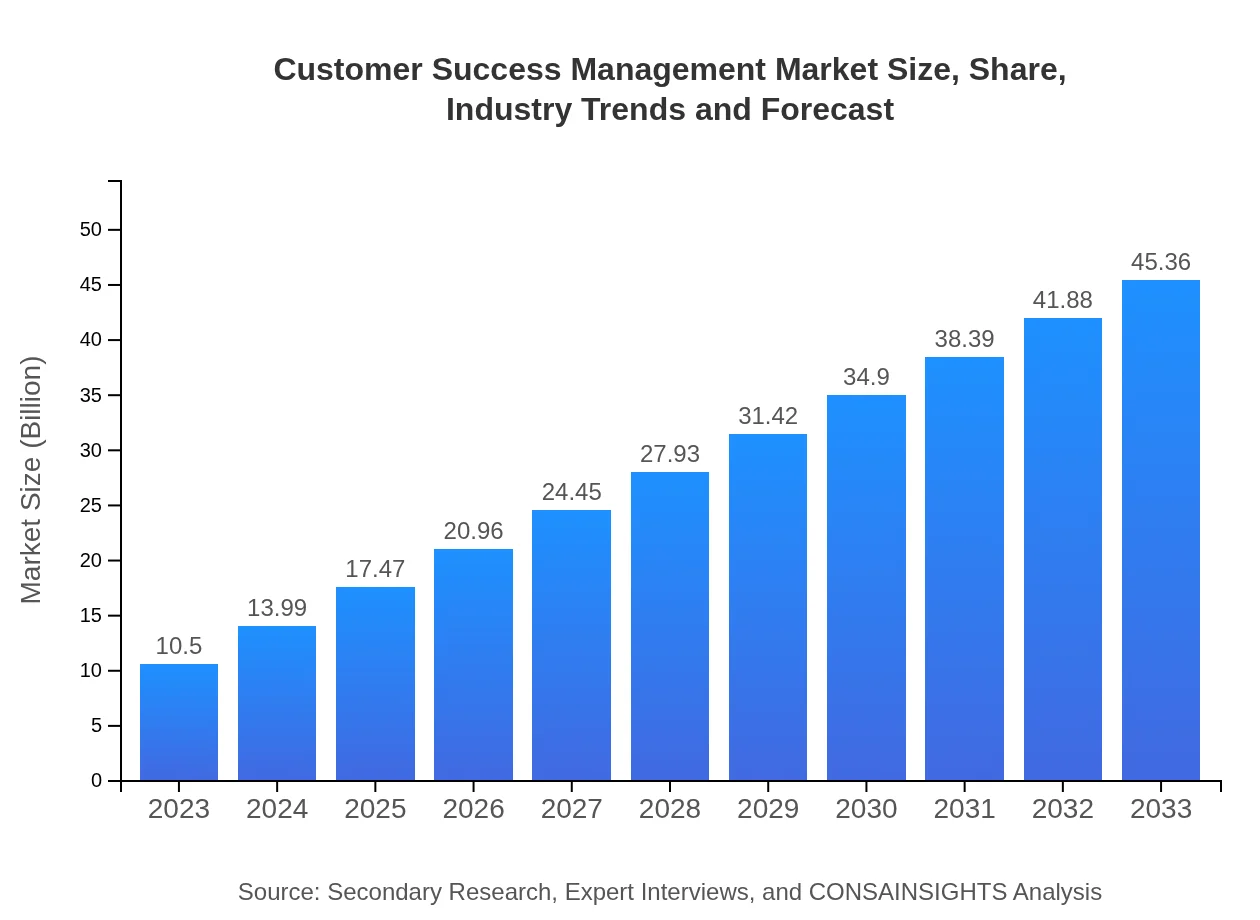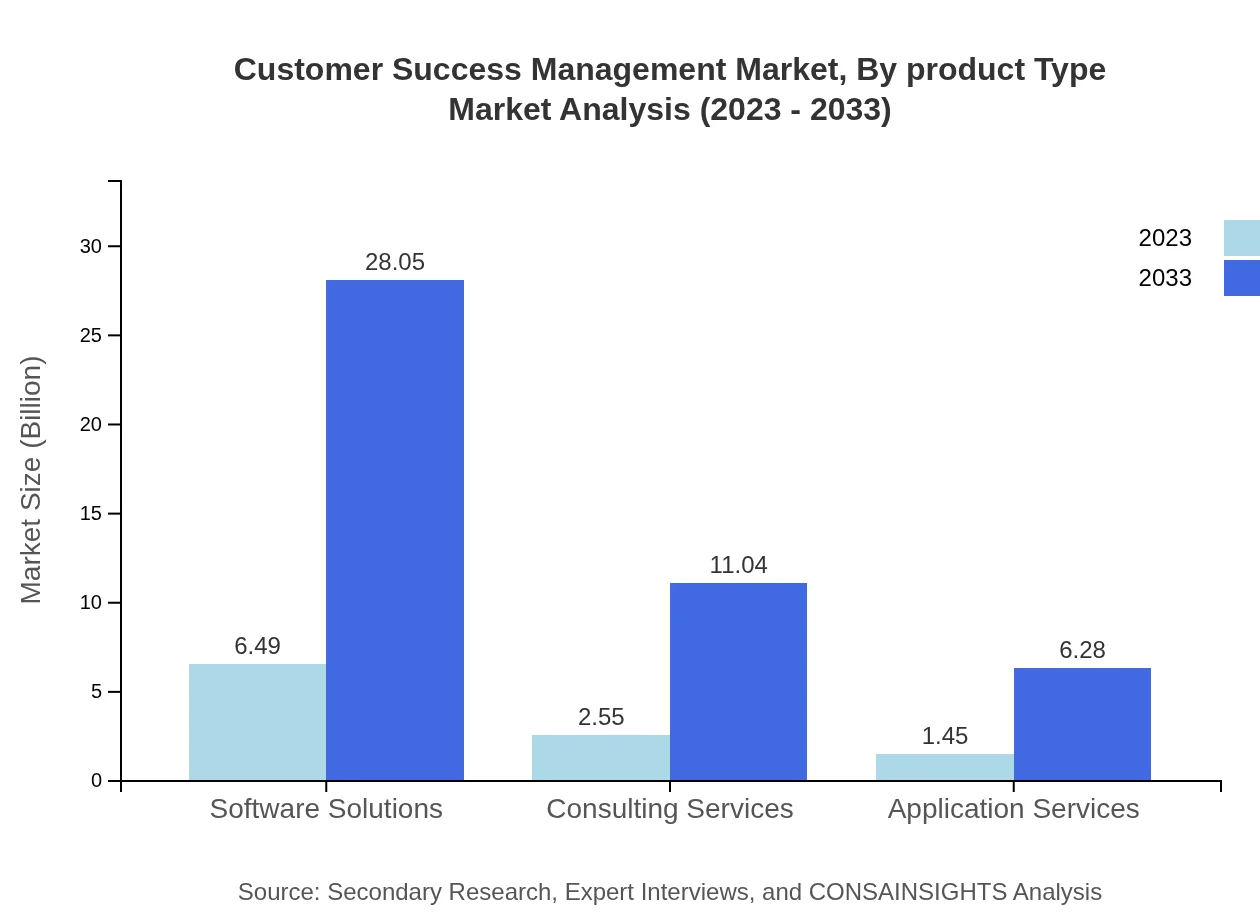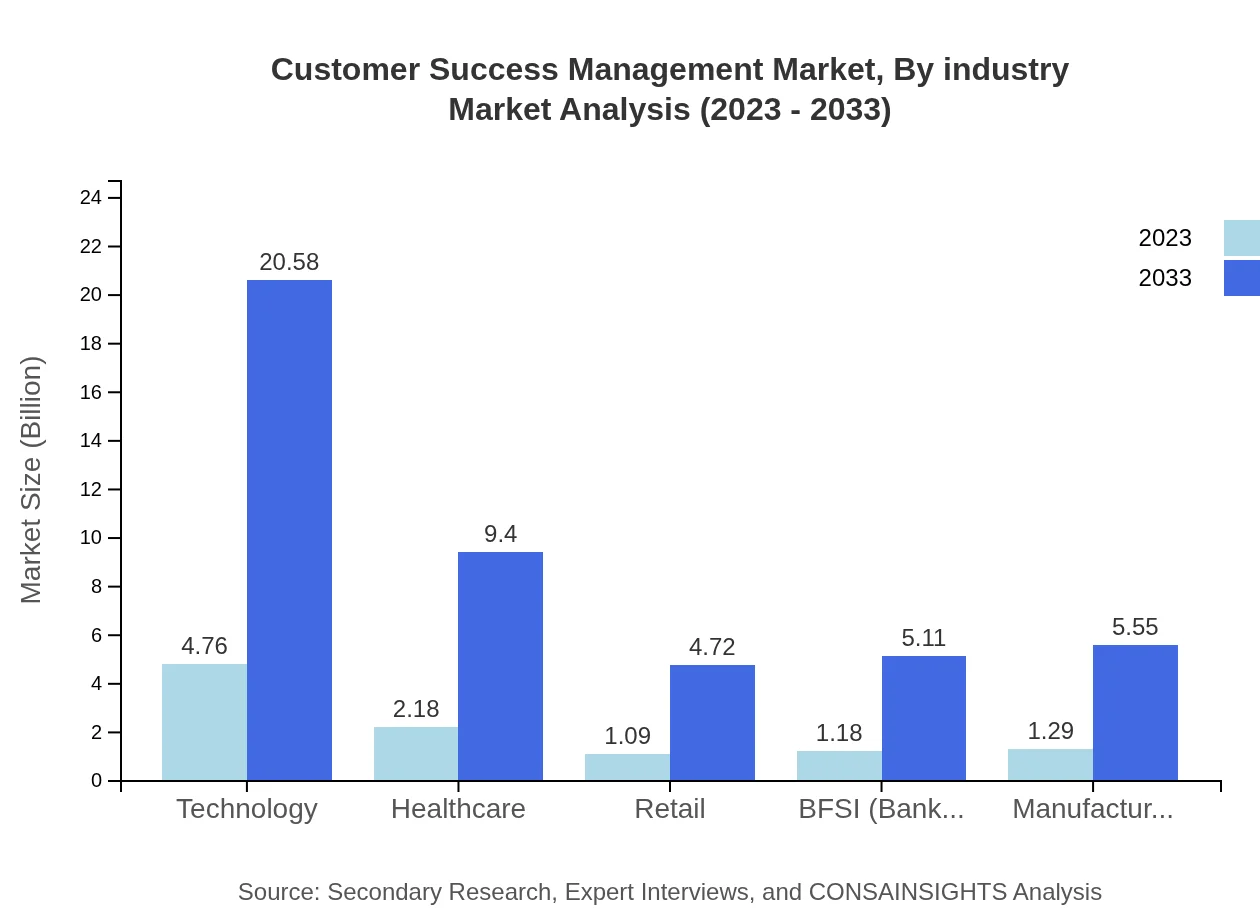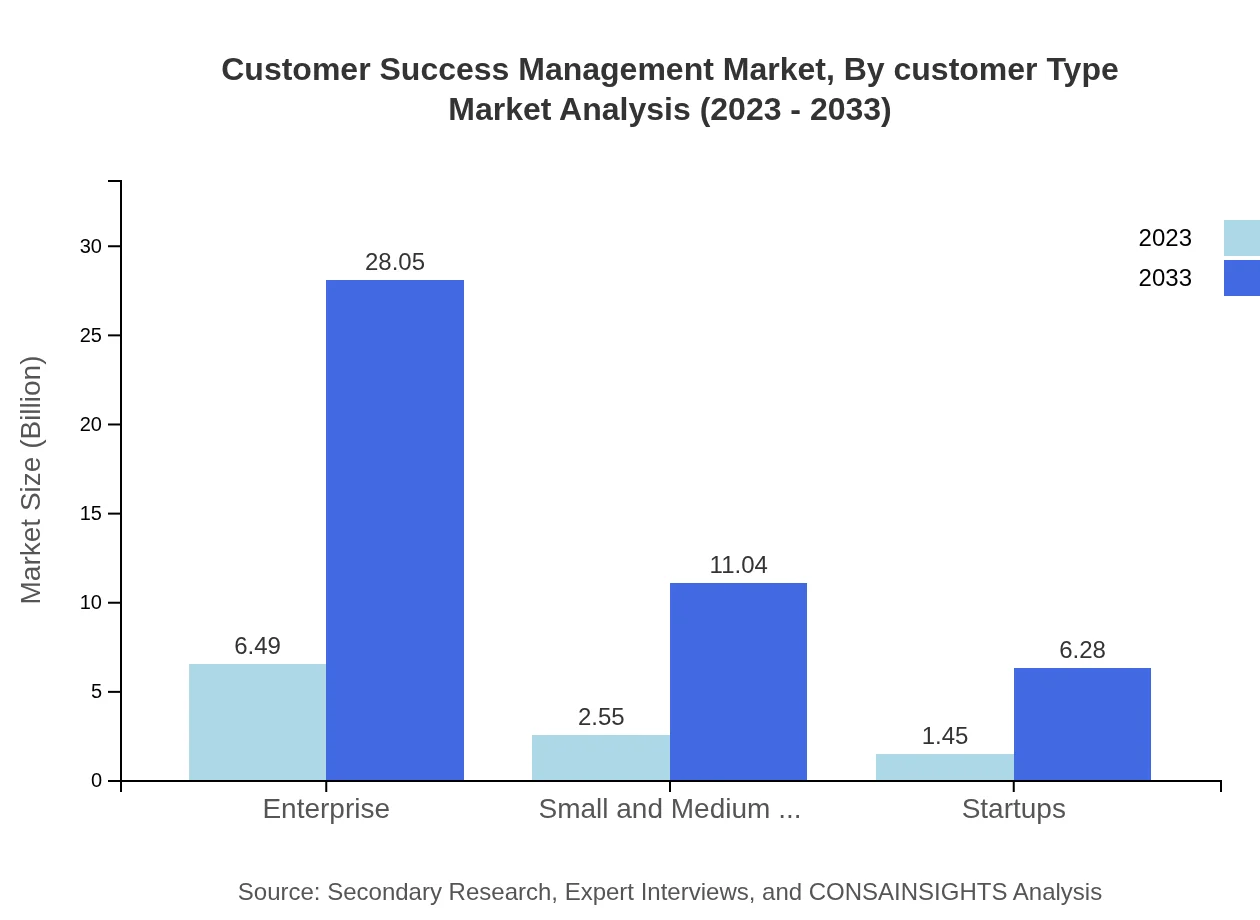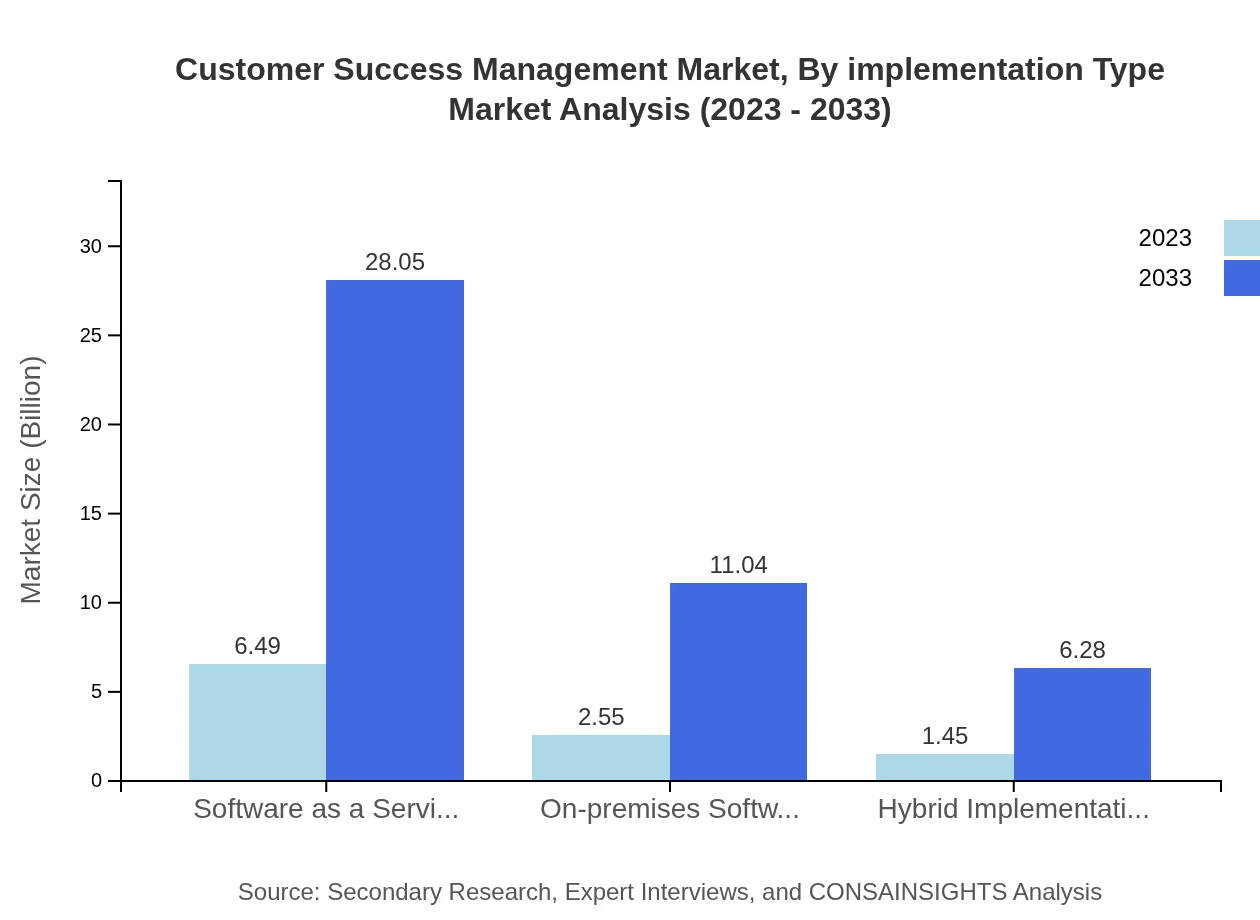Customer Success Management Market Report
Published Date: 31 January 2026 | Report Code: customer-success-management
Customer Success Management Market Size, Share, Industry Trends and Forecast to 2033
This report provides a comprehensive analysis of the Customer Success Management market from 2023 to 2033, detailing market trends, size, and forecasts, along with insights into regional performance and key industry players.
| Metric | Value |
|---|---|
| Study Period | 2023 - 2033 |
| 2023 Market Size | $10.50 Billion |
| CAGR (2023-2033) | 15% |
| 2033 Market Size | $45.36 Billion |
| Top Companies | Salesforce, Zendesk, HubSpot, Gainsight, Qualtrics |
| Last Modified Date | 31 January 2026 |
Customer Success Management Market Overview
Customize Customer Success Management Market Report market research report
- ✔ Get in-depth analysis of Customer Success Management market size, growth, and forecasts.
- ✔ Understand Customer Success Management's regional dynamics and industry-specific trends.
- ✔ Identify potential applications, end-user demand, and growth segments in Customer Success Management
What is the Market Size & CAGR of Customer Success Management market in 2023?
Customer Success Management Industry Analysis
Customer Success Management Market Segmentation and Scope
Tell us your focus area and get a customized research report.
Customer Success Management Market Analysis Report by Region
Europe Customer Success Management Market Report:
Europe's Customer Success Management market, worth approximately $2.77 billion in 2023, is projected to reach $11.96 billion by 2033. Growing regulatory pressures around customer data management and enhanced focus on customer experience are significant contributors to this growth.Asia Pacific Customer Success Management Market Report:
The Asia Pacific region is poised for significant growth in the Customer Success Management market, with a projected market value of $2.25 billion in 2023, expanding to $9.73 billion by 2033. This growth is propelled by increasing digital transformation initiatives among enterprises and a heightened focus on customer retention strategies.North America Customer Success Management Market Report:
North America leads the global Customer Success Management market, valued at approximately $3.47 billion in 2023, and anticipated to grow to $14.99 billion by 2033. The region benefits from advanced technology adoption, extensive investment in customer engagement technologies, and established best practices across industries.South America Customer Success Management Market Report:
In South America, the CSM market is expected to grow from $1.04 billion in 2023 to $4.48 billion in 2033. The region's expanding digital economy and the rising importance of customer experience are key drivers of this growth, with businesses increasingly recognizing the value of customer success methodologies.Middle East & Africa Customer Success Management Market Report:
The CSM market in the Middle East and Africa is expected to progress from $0.97 billion in 2023 to $4.20 billion by 2033. This growth is supported by increasing digitalization across various sectors and a growing emphasis on customer satisfaction and loyalty.Tell us your focus area and get a customized research report.
Customer Success Management Market Analysis By Product Type
The Customer Success Management market comprises various product types, including Software Solutions, Consulting Services, and Application Services. In 2023, Software Solutions lead this segment with a market size of $6.49 billion, expected to expand to $28.05 billion by 2033, holding a market share of approximately 61.83% throughout the forecast period.
Customer Success Management Market Analysis By Industry
Healthcare, BFSI (Banking, Financial Services, and Insurance), and Manufacturing are the leading industries in the Customer Success Management sector. For instance, the healthcare segment accounted for $2.18 billion in 2023 and is projected at $9.40 billion by 2033, emphasizing the crucial impact of CSM on patient care and service quality.
Customer Success Management Market Analysis By Customer Type
The market addresses diverse customer types, including Enterprise, Small and Medium Businesses (SMBs), and Startups. Enterprises take the largest share with a market size of $6.49 billion in 2023, expanding to $28.05 billion by 2033, reflecting their substantial investment in CSM for enhancing customer relationships.
Customer Success Management Market Analysis By Delivery Model
The Cloud-based delivery model dominates the Customer Success Management landscape, with a size of $8.51 billion in 2023, expanding to $36.77 billion by 2033. This model's predominance is driven by its flexibility and efficient service delivery.
Customer Success Management Market Analysis By Implementation Type
The implementation of CSM services varies, with Software as a Service (SaaS) leading the segment at $6.49 billion in 2023, set to grow to $28.05 billion by 2033. This growth indicates a strong trend towards leveraging cloud solutions for enhancing customer success strategies.
Customer Success Management Market Trends and Future Forecast
Tell us your focus area and get a customized research report.
Global Market Leaders and Top Companies in Customer Success Management Industry
Salesforce:
Salesforce is a global leader in cloud-based customer relationship management, providing innovative CSM tools that enable businesses to drive success through enhanced customer engagement.Zendesk:
Zendesk offers a comprehensive suite of customer experience solutions, with robust analytics and support features designed to improve customer success and retention.HubSpot:
HubSpot is renowned for its integrated platform that combines marketing, sales, and service tools, significantly enhancing customer success management capabilities.Gainsight:
Gainsight specializes in customer success management solutions, providing insights and analytics that help organizations to optimize customer experience and improve satisfaction.Qualtrics:
Qualtrics leverages experience management software to empower organizations to manage customer success effectively, utilizing data-driven insights to enhance customer experience.We're grateful to work with incredible clients.









FAQs
What is the market size of Customer Success Management?
The Customer Success Management market is currently valued at approximately $10.5 billion, with an expected compound annual growth rate (CAGR) of 15% over the next decade, showcasing robust growth potential.
What are the key market players or companies in the Customer Success Management industry?
Key players in the Customer Success Management sector include major technology solutions firms, consulting agencies, and software companies. They compete on innovation, customer retention strategies, and integration capabilities to capitalize on growing demand.
What are the primary factors driving the growth in the Customer Success Management industry?
Factors driving growth include the increasing necessity for customer-centric business models, digital transformation across sectors, and the rising demand for data analytics in enhancing customer experiences, which fosters retention and loyalty.
Which region is the fastest Growing in Customer Success Management?
North America is the fastest-growing region, projected to expand from $3.47 billion in 2023 to $14.99 billion by 2033, followed closely by Europe and Asia-Pacific, reflecting rapidly increasing adoption rates.
Does ConsaInsights provide customized market report data for the Customer Success Management industry?
Yes, ConsaInsights offers tailored market reports, enabling clients to gain customized insights and data analysis specific to their needs and business objectives within the Customer Success Management industry.
What deliverables can I expect from this Customer Success Management market research project?
Clients can expect comprehensive reports, detailed data analysis, infographics, market forecasts, and strategic recommendations, covering various segments, including technology, healthcare, and regional trends.
What are the market trends of Customer Success Management?
Current trends include the rise of cloud-based solutions, increased investment in AI for customer insights, a shift towards subscription models, and enhanced focus on personalized customer engagement strategies.

